The popularity of Donald Trump among Republicans poses huge long-term threats to the Republican Party. In a nation that is increasingly diverse, the nomination of Trump could further cement the party’s image as the party of bullying white bigots and misogynists. But if there is a silver lining associated with the dark Trump cloud, it is this: It sometimes creates the perception that Trump rivals like Senator Marco Rubio are “moderate” by comparison. If Rubio gets the nomination, such a “moderate” label would serve him well.
That’s quite a gift to Senator Rubio, because he is far from a moderate. Rubio’s positions put him far, far to the right on the American political spectrum. For instance:
 Rubio ran for Senate in Florida as the candidate of the extremist Tea Party, not as the moderate alternative to the Tea Party.
Rubio ran for Senate in Florida as the candidate of the extremist Tea Party, not as the moderate alternative to the Tea Party.- He has a lifetime pro-choice record of 0% from NARAL Pro-choice America.
- On safety net issues, the Alliance for Retired Americans gives him a lifetime voting record rating of just 5%.
- On environmental issues, the League of Conservation Voters gives him a lifetime voting record score of only 9%.
- On science issues, the Evolution Institute rates his voting record a rock bottom 0%.
- On veterans issues, the Disabled Veterans of America gave the flag waving Rubio a 0% on its most recent rating.
- Overall, the American Conservative Union (ACU) gives Rubio a lifetime voting record rating of 98%. In other words, Senator Rubio favored this ultra-conservative group’s positions 98% of the time. For context, conservative Senator Lindsey Graham (R-SC) got an 87% rating, conservative House Speaker John Boehner got an 83% rating, and Senator Susan Collins (R-ME), an actual “moderate,” got a 47% ACU rating.
Admittedly, the definition of a political “moderate” is not a precise one. But I think we all can agree that the definition of “moderate” is not “one who supports conservative or liberal positions 98% of the time.”
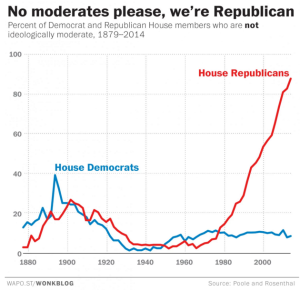 By any reasonable measure, Senator Rubio is a far-right extremist, as is Ohio Republican Governor John Kasich (88% lifetime ACU rating), who is also sometimes inaccurately labeled a moderate by simplistic pundits. Political scientists have documented the fact that Republican members of Congress have moved sharply to the right in recent years, and that seismic shift away from the political center is reflected in this year’s field of Republican presidential contenders.
By any reasonable measure, Senator Rubio is a far-right extremist, as is Ohio Republican Governor John Kasich (88% lifetime ACU rating), who is also sometimes inaccurately labeled a moderate by simplistic pundits. Political scientists have documented the fact that Republican members of Congress have moved sharply to the right in recent years, and that seismic shift away from the political center is reflected in this year’s field of Republican presidential contenders.
Senator Rubio is not even a moderate in comparison to Mr. Trump. Rubio is more considerably conservative than Trump on several issues, such as affirmative action, Planned Parenthood funding, a progressive income tax, gay rights, and an assault weapon ban.
It is true that Senator Rubio’s rhetorical tone is more mild than Trump’s, and that often drives shallow pundits’ characterization of him as a “moderate.” The Atlantic’s Peter Beinart explains Rubio’s smooth style well:
Rubio has mastered the same technique Barack Obama used so effectively when he was seeking the presidency. When faced with a controversial issue, he doffs his cap to the other side, pleads for civility and respect, insists that it’s a hard call—and then comes out exactly where you’d expect him to come out. On social issues, Rubio is as predictably conservative as Obama is predictably liberal. What they share is their moderate-sounding rhetorical style.
But in the end, moderation is not a function of decibels and diplomacy. Ultimately, it is a function of positions on the issues. If moderate voters are searching for a substantive moderate in this year’s Republican presidential field, the truth is they’re not going to find one.

 Watching the news coverage of the Republican presidential campaign, you get the feeling that there is a wave of support for the ideas of leading Republican candidates like Donald Trump, Ben Carson, Ted Cruz and Marco Rubio. For example,
Watching the news coverage of the Republican presidential campaign, you get the feeling that there is a wave of support for the ideas of leading Republican candidates like Donald Trump, Ben Carson, Ted Cruz and Marco Rubio. For example, 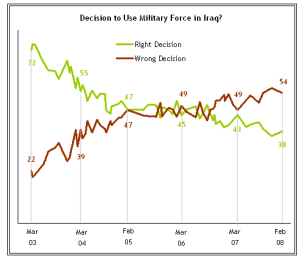 In other words, the national mood is much like when America rushed into the Iraq War in 2003.
In other words, the national mood is much like when America rushed into the Iraq War in 2003. 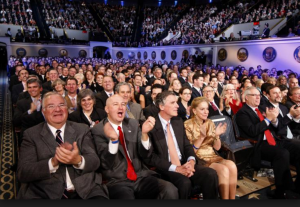 If I were a political party chair, I would make one simple adjustment to make my party more competitive. I would only allow general election swing voters to attend candidate debates.
If I were a political party chair, I would make one simple adjustment to make my party more competitive. I would only allow general election swing voters to attend candidate debates.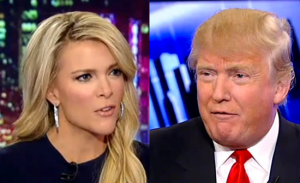 So, Donald Trump
So, Donald Trump 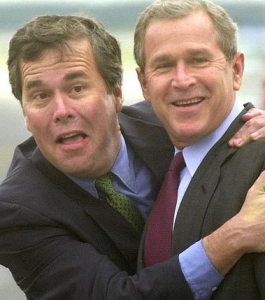 Prior to the Trump surge, Jeb Bush was being compared to his brother former-President George W. Bush, and he wasn’t managing that comparison well. He was
Prior to the Trump surge, Jeb Bush was being compared to his brother former-President George W. Bush, and he wasn’t managing that comparison well. He was 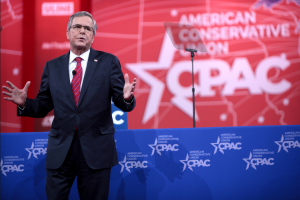 This is hardly a Republican “moderate” in the tradition of other Republican Presidents, such as Theodore Roosevelt, who was pro-union and anti-corporate monopoly, Dwight Eisenhower, who spent heavily on government-funded infrastructure and warned us about the military-industrial complex, or Richard Nixon, who created the Environmental Protection Agency and worked with Teddy Kennedy on a more generous version of Obamacare. Those are Republican moderates, not Jeb Bush.
This is hardly a Republican “moderate” in the tradition of other Republican Presidents, such as Theodore Roosevelt, who was pro-union and anti-corporate monopoly, Dwight Eisenhower, who spent heavily on government-funded infrastructure and warned us about the military-industrial complex, or Richard Nixon, who created the Environmental Protection Agency and worked with Teddy Kennedy on a more generous version of Obamacare. Those are Republican moderates, not Jeb Bush.